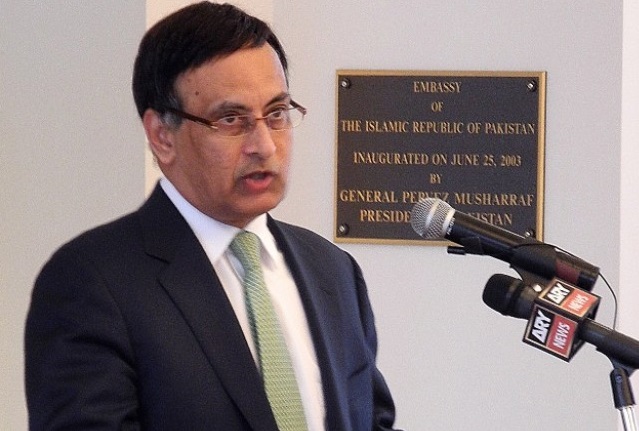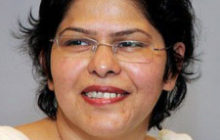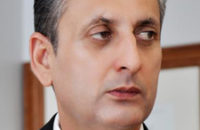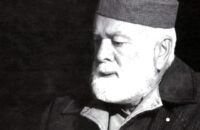Author and analyst Husain Haqqani says that both India and Pakistan are mired in a hyper-nationalist frenzy right now
by Elizabeth Roche
New Delhi: There is a perception in Pakistan that 69 years after Partition, India still wants to punish Pakistan for parting as a separate nation, says Pakistani author and analyst Husain Haqqani. In India to promote his book India vs Pakistan: Why can’t we just be friends, Haqqani says the space for friendship between the two nations is shrinking and that the subcontinent lacks visionary leadership that would pull the two out the stalemate. Edited excerpts from an interview:
Your book talks of how 69 years after Partition, India and Pakistan are yet to be friends. Given the situation as it exists today, do you see any hope of an evolution in ties?
I definitely have hope but I do not have expectations. In my book I say that the space for friendship is shrinking. It is quite obvious to me that both India and Pakistan are right now mired in a hyper-nationalist frenzy. In that frenzy, each only sees what the other side is doing wrong or has done wrong in the past. I am trying to get people to focus on the big picture. And that is that Pakistan in particular cannot afford to consider India an eternal enemy. At the same time I am very cautious about saying that it is about to happen—I don’t think it is about to happen.
Why do you think the space for friendship with India is shrinking?
Because India is also moving towards hyper-nationalist sentiment. I think the shift that has taken place in India in the past few years is far more striking than anything that has happened in Pakistan. In India, there is a new anger towards Pakistan and a tendency to uphold the two-nation theory by being dismissive about India’s own minorities. And that may actually undermine the space for friendship. When some Indians tell other Indians that you should go to Pakistan, that basically means that they are talking of cutting those people out of India’s life and obviously keeping Pakistan out of India’s life. And that attitude is disturbing to me. I think what is needed in the India-Pakistan relationship is a major change of attitude. And while I know that change of attitude has to come in Pakistan in a big way, I am forewarning my Indian friends that they should also be wary of similar attitudes arising in their country.
But some would say these are isolated voices, fringe elements. There have been many efforts by India to reach out, many meetings between the prime ministers of India and Pakistan.
Those are symbolic diplomatic activities, and I don’t think that symbolism is more important than substance. The substance never really moved. I point out in my book that India and Pakistan have had 55 summit-level meetings. If 55 summit meetings have not resulted in a major shift in our relationship, a 56th summit meeting is not going to do it. There is something more that is going on here and that ‘more’ is what I want people to pay attention to.
Prime Minister Narendra Modi visited Pakistan on 25 December. Wasn’t that a gesture of reaching out to Pakistan?
I think gestures are a news story and statements are something that only journalists pay attention to. When you have created a view of each other as enemies, and particularly in Pakistan where people have been brought up to think of India as the eternal threat, then you need far more than gestures. I have pointed out the many occasions when there has been this euphoria that we are on the verge of a breakthrough, my suggestion is that do not try to portray everything as a breakthrough because then after that there will be a breakdown. Instead, pay attention to try and correct the thinking process that has brought us to this pass. Since the early days, Pakistan has lived under contrived threats and Pakistanis have been told that we have a large neighbour that is bent upon ending our existence. Pakistan’s insecurities have not ended even after the acquisition of nuclear weapons. If nuclear weapons can’t secure a country then the insecurity has to be psychological. So that is the context of India-Pakistan relations. In the last 30 years, Pakistan’s support for terrorism has obviously become the major irritant. But once that irritant is removed, a new irritant will probably arise because that is the nature of the beast. So I am arguing that we need to focus on that. When I say why we can’t we just be friends, I am actually forcing people to think beyond the contrived narratives. Pakistan and India need to look at each other as two neighbouring countries. And their leaders need to start thinking as statesmen.
So what is the way forward?
Sometimes the way forward is to stand still. Stop looking for immediate breakthroughs, work the relationship. There are many examples of this—China and Taiwan from 1949 to 1974 just portrayed each other as enemies. China and Taiwan now are keeping their claims but they are maintaining a relationship in which Taiwanese can freely travel to China and the Chinese travel freely to Taiwan. The two entities trade heavily and there is considerable interaction. So the hostilities are dissipating. I am talking about that kind of a visionary approach. My point is that this quick-fix desire—that if we can settle one thing and then we move forward—that is not going to change the fundamentals of the relationship. The fundamentals will change when the Pakistanis start saying ‘no, India is not an eternal threat to us’ and when Indians start looking at Pakistan as a country with which we have shared history but we will not forever hold it against them that they broke out of Mother India.
Is the present leadership in the subcontinent visionary enough to do this?
I look upon leadership as more than just political leadership. It means intellectuals, teachers, scholars, those in the media and also politicians. Let me put it this way, the subcontinent has not thrown up people—even before Partition—who had the vision to understand the complexity and diversity of the subcontinent. In democracies, opinion makers matter. India has tried to punish Pakistan for leaving the “joint family” as (Mahatma) Gandhiji put it. That has created a bitterness on the Pakistani side. Pakistan on its part under the leadership and inspiration of the military and its leadership has chosen to spend all its energy in trying to justify why it moved out of the ‘joint family’. I am saying 69 years later, stop worrying about justifying the creation of Pakistan and start thinking about the future and prosperity of Pakistan. Stop thinking that blocking India everywhere is or should be Pakistan’s objective. I think this comes from that feeling of insecurity that somehow Pakistani nationalism means opposition to India. And that harms Pakistan. A note of caution: Indian nationalism should also be something more than just being defined in terms of who is the enemy.
I remember a visit by former Pakistan prime minister Atal Bihari Vajpayee to the Minar-e-Pakistan in Lahore in 1999. That was all about reassuring Pakistan that India was not looking to roll back history .
I have cited many more instances—of how Nehru tried to reassure Pakistan, how prime minister Vajpayee’s visit was designed to reassure Pakistan, the leader of a Hindu nationalist party going to the site where the idea of Pakistan was first put into a resolution and saying that we accept Pakistan as a reality and our neighbour. Those attempts at reassurance have to be acknowledged. All I am saying is that they haven’t had the desired effect, partly because there is a structure for conflict in Pakistan that does not allow for these things to sink in. Self-confidence requires us to know that if Islam has survived for 14 centuries and Pakistan for seven decades, if we keep Pakistan stable and do not put it in jeopardy Pakistan will stay forever.
You mentioned that one of the big irritants in the India-Pakistan relationship is Pakistan’s use of terrorism as an instrument of state policy. Is Pakistan likely to give this up?
Pakistan has had a policy of irregular warfare with India to compensate for its lack of proportional size to India. I think so far it has been able to do so because the price it has had to pay was not too high in the eyes of its military leaders. I think the price is rising. Pakistan faces considerable global isolation, Pakistanis cannot move around the world as easily as they used to, Pakistan’s exports are declining because after all, only those countries whose citizens can move more freely can export more freely. The international pressure on Pakistan is at an all-time high. I think now that the law of diminishing returns is coming into play, I think that in a few more years Pakistan’s ability to persist with that policy will just not be able to sustain itself. That is my hope. Ideally, I want Pakistan to consciously make that decision and say we do not need jihadis. Often it is said Americans came here with the jihad against the Soviets and now we are stuck with it. That ended in 1989. But the jihadis who are being caught nowadays are between the ages of 17-23. They were certainly not trained for jihad with the Soviet Union. And it is time for Pakistan to recognize that. If they don’t do it voluntarily, I think the world will force Pakistan to roll back terrorism—whether Pakistan likes it or not.
























